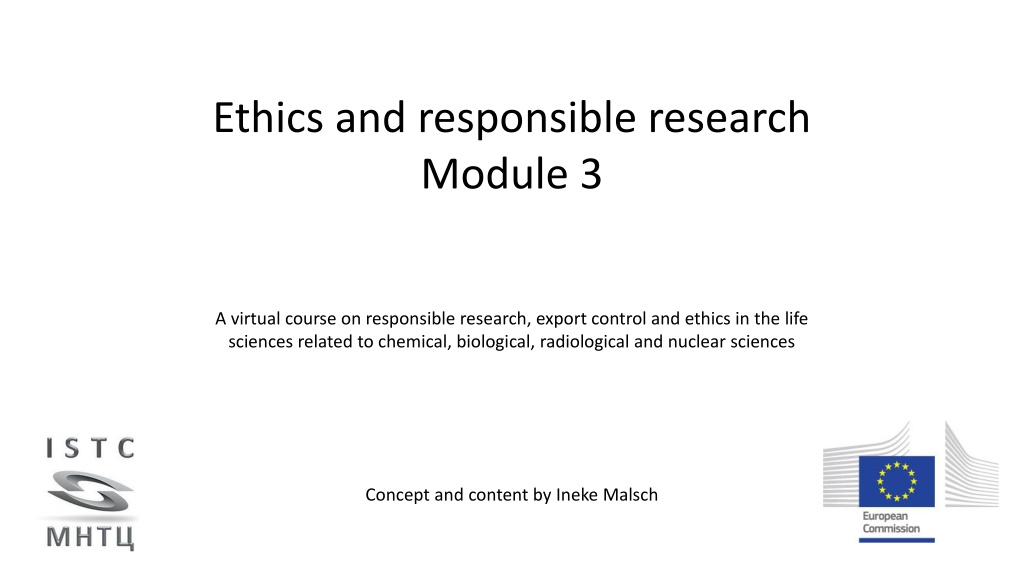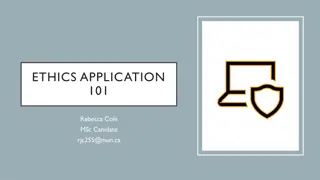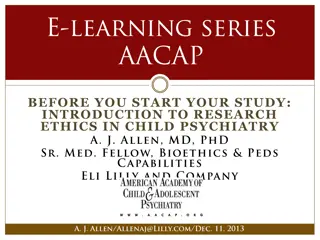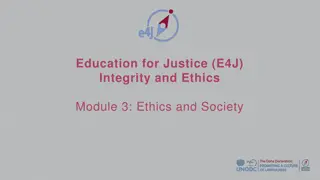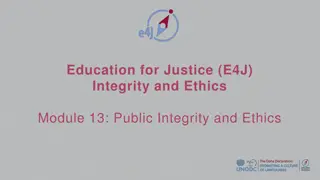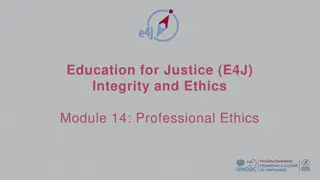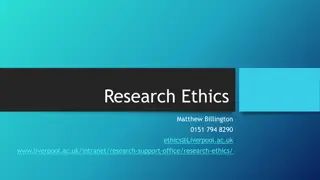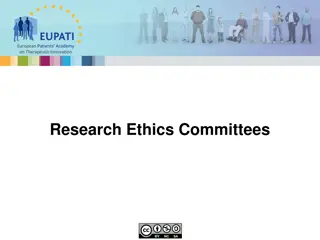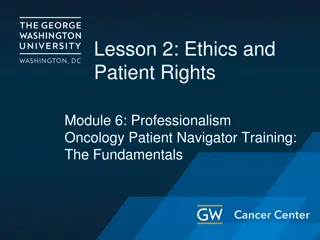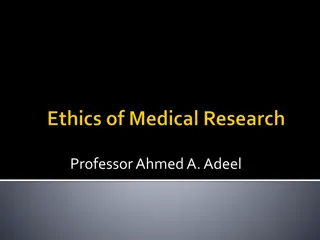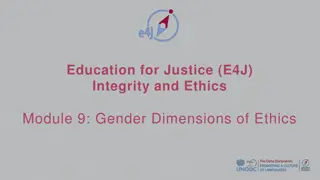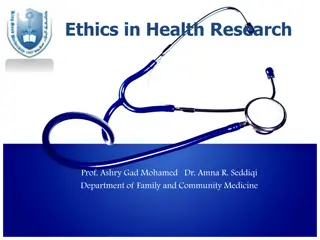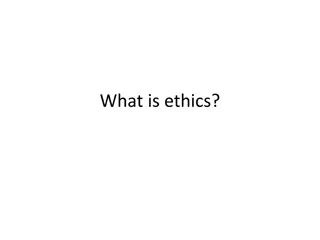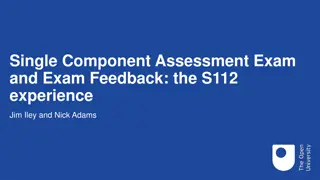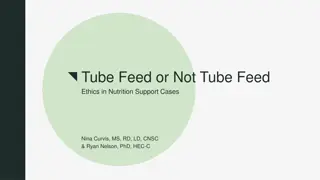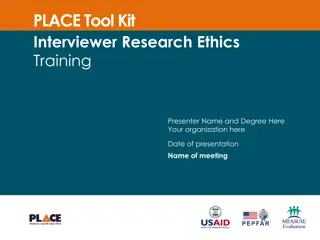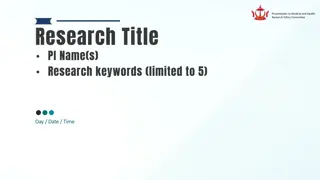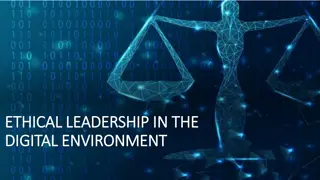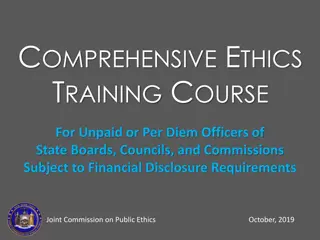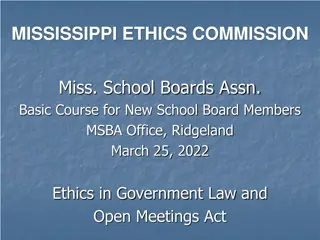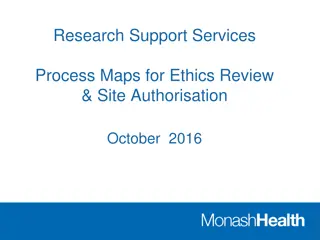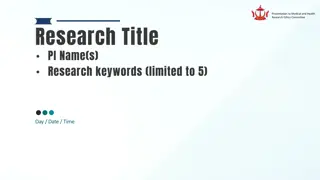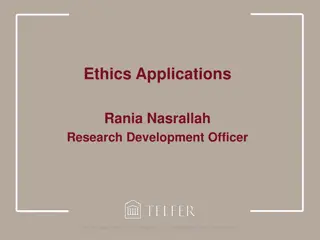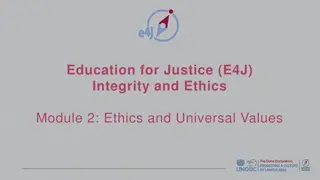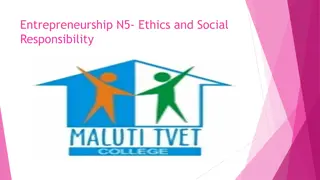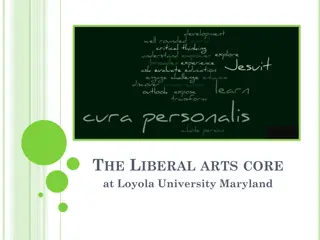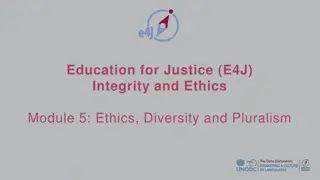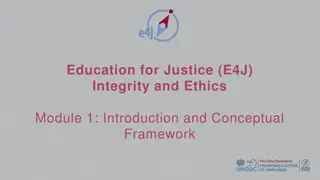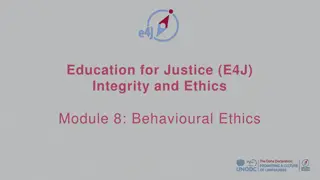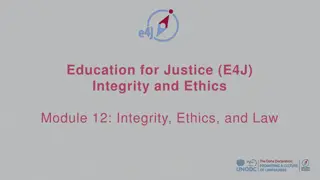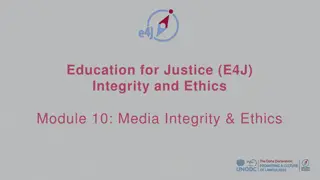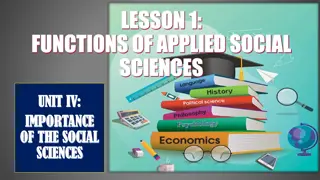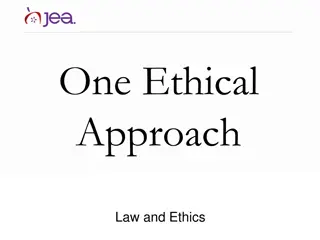Module 3: Ethics and Responsible Research in Life Sciences
Explore ethical dilemmas in scientific research, with a focus on dual-use technologies and security issues. Learn from real-world cases and consider the balance between ethical theory and practical applications in the life sciences field.
Download Presentation

Please find below an Image/Link to download the presentation.
The content on the website is provided AS IS for your information and personal use only. It may not be sold, licensed, or shared on other websites without obtaining consent from the author. Download presentation by click this link. If you encounter any issues during the download, it is possible that the publisher has removed the file from their server.
E N D
Presentation Transcript
Ethics and responsible research Module 3 A virtual course on responsible research, export control and ethics in the life sciences related to chemical, biological, radiological and nuclear sciences Concept and content by Ineke Malsch
Acknowledgements This virtual course on responsible research, export control and ethics in the life sciences related to chemical, biological, radiological and nuclear sciences has been produced and prepared for the International Science and Technology Center (ISTC) as part of the EU funded Targeted Initiative on CBRN Export Control on Dual-Use Materials and Intangible Technologies. The support of the European Commission for this course does not constitute endorsement of the contents which reflects the views only of the authors. The content of the course was created by Ineke Malsch. The project team of the Targeted Initiative on CBRN Export Control on Dual-Use Materials and Intangible Technologies provided comments and editing of the material.
Module 3 Discussing ethical dilemmas Introduction ethical dilemmas The aim of this module is to stimulate you to think about the ethical issues and risks related to the introduction and use of scientific knowledge and technologies in society. In this module, we will discuss real-world ethical and professional dilemmas faced by life scientists It is the core module of the course, balancing ethical theory and practical applicability. Selected cases are introduced: to illustrate how different approaches to organising collective responsibility cases are introduced to illustrate how dual use, misuse and security can be addressed to illustrate how ethical frameworks can be considered in a balanced way in real life practices Important additional information is included in the notes section of the slides
Module 3 Discussing ethical dilemmas Case Study: publishing results of Dual Use Research of Concern Export permits for publishing Gain of Function research results. In 2011, the US and Dutch governments delayed publication of breakthrough research papers about ferrets transferring avian flu by sneezing. The research groups of Yoshihiro Kawaoka (Wisconsin) and Ron Fouchier (Rotterdam) were obliged to revise their papers and apply for an export permit before publishing the results in international Journals eventually they were allowed to publish revised papers. This sparked international public debate in the media, among stakeholders and in the scientific community and led to a moratorium on funding Gain of Function research in the USA (2014-2017).
Module 3 Discussing ethical dilemmas Case Study: publishing results of Dual Use Research of Concern Export permits for publishing Gain of Function research results. The researchers were aware of biosecurity issues and how to handle them, e.g. Fouchier had been consulted during the preparation of a biosecurity code of conduct by the Royal Netherlands Academy of Arts and Sciences (KNAW) in 2007. The controversy showed that the security concerns of the Dutch government were not completely addressed by the biosecurity code of conduct, but a new request by the government for advice from the KNAW on improving biosecurity (published in 2013) did not generate consensus on a more satisfactory way to protect biosecurity. Revisiting the concepts and tools scientists can use for fulfilling their special role in the collective responsibility for dual use life sciences in module 2 What could the scientists featuring in this case have done differently? Should the scientists featuring in this case have done things differently?
Module 3 Discussing ethical dilemmas Case Study: publishing results of Dual Use Research of Concern Export permits for publishing Gain of Function research results. Several aspects of the debate on this case of Gain of Function research illuminate the special role of scientists in the collective responsibility for governing life sciences in society. From a scientific perspective: From a societal perspective: the experiment is important and interesting science as it may elucidate evolutionary mechanisms necessary to confer transmissibility. This experiment can lead to an extraordinary scientific insight. However, there are risks involved, in this case giving a virus the ability to be transmissible by another route with pandemic potential if it infects a lab worker.
Module 3 Discussing ethical dilemmas Case Study: publishing results of Dual Use Research of Concern Scientists should be aware of the potential risks involved, to the researcher and to society at large. However, mere awareness does not prescribe a specific course of action. The point of the example is to show that people participating in the discussion had different interpretations of the case and of the status of the (biosecurity) code of conduct the scientists abided by. Subject to judgements, biases, believes, ect. The case also demonstrates clearly that the research does not exist in a vacuum of supposed scientific objectivity in some imagined space dissociated from society research is embedded in society. This case also demonstrates that neglecting to take into account societal implications can be disruptive to research endeavour.
Module 3 Discussing ethical dilemmas Issues related to the institutionalisation of science and of society: group think Group think hinders engagement in a collective responsibility for governance of life sciences in society Group think is a rationalized conformity an open, articulate philosophy which holds that group values are not only expedient [useful] but right and good as well (William H. Whyte Jr. 1952) Group think is to some extent a natural social phenomenon, facilitating social relations between members of a community, and inspiring adherence to common values such as professional pride and a sense of responsibility Problematic aspects of group think are: overestimation of the power and morality of the group, closed-mindedness and pressures towards uniformity A telling example is the analysis of the group dynamics in a nuclear weapons laboratory by Hugh Gusterson (1996): the researchers were not encouraged to reflect on ethical issues. The social and institutional features and configurations in the laboratory justified, normalised and legitimized weapons research through abstraction on one side and group dynamics on the other.
Module 3 Discussing ethical dilemmas Fragmentation of responsibility The organisation of the collective responsibility for governance of life sciences in society is not self-evident One problem is the existence of responsibility voids, i.e. situations in which an outcome results from individual interactions but for which no one is responsible. Another is that responsibility can be fragmented in the sense that responsibility bearing individuals may be responsible for different features of the outcome. Braham & Hees (2018) Even when governments, researchers, industry and civil society organisations perform their designated role responsibility, the overall result may be a fragmentation of responsibilities Fragmentation may lead to overlap and collisions, e.g. if two organisations are responsible for responding to the same crisis, but each has a different aim and different competences Fragmentation may also lead to gaps where no organisation or individual has the formal role responsibility to respond to a crisis or to address a risk Progress in science and emerging technology continuously creates new gaps by introducing unforeseen new risks.
Module 3 Discussing ethical dilemmas Ethical dilemmas in scientific practice There is no single universal standard for performing science in society, some scientists tend to stress research integrity standards, while others focus more on contributing to societal goals. WEF Young Scientists code of ethics ALLEA research integrity principles Exercise In this exercise, you should compare the criteria in the ALLEA code of conduct for research integrity and in the Young Scientists code of ethics (summarised on the right) Engage with the public Reliability Pursue the truth Honesty Minimize harm Respect Engage with decision makers Accountability Examine both codes. Which criteria do they have in common? Are these criteria interpreted in the same way? Support diversity Be a mentor What are differences between the codes? What does this imply for the preferred role of science in society in each case? Be accountable
Module 3 Discussing ethical dilemmas Hague Ethical Guidelines Jigsaw Exercise* To promote a culture of responsible conduct in the chemical sciences and to guard against the misuse of chemistry, a group of chemical practitioners from around the world have formulated a set of ethical guidelines informed by the Chemical Weapons Convention. The Hague Ethical Guidelines are intended to serve as elements for ethical codes and discussion points for ethical issues related to the practice of chemistry under the Convention. 9 Ethical Guidelines (8, plus the core element) The exercise is configured for 36 participants but can be adapted for multiple group sizes, as long as you keep numbers similar in each group. Sustainability Core element. Education Achievements in the field of chemistry should be used to benefit humankind and protect the environment. Awareness & Engagement Example Combinations: 4 groups of 4, discuss 4 principles. 3 groups of 3, discuss 3 principles. 5 groups of 5, discuss 5 principles, etc Ethics Safety & Security Accountability Oversight * This exercise has been created by Prof Alistair Hay for the OPCW Advisory Board on Education and Outreach (ABEO) Exchange of information
Module 3 Discussing ethical dilemmas Hague Ethical Guidelines Jigsaw Exercise - Running the Exercise 1. Create your groups and allocate each group a number and a letter (see right). 2. Give each group a separate principle to discuss. Emphasise the need for each member of the group to become an expert on the principle, as they will each have to argue its importance in the next step of the exercise. 3. Give the groups 15 to 20 minutes to familiarise themselves with the principle and the reasons why it is important. Some may take notes, but this is not mandatory.
Module 3 Discussing ethical dilemmas Hague Ethical Guidelines Jigsaw Exercise - Running the Exercise 4. While they are discussing their principle go round each table and assign each member of the group a letter (A to C for 3 person groups, A to D for 4 person groups etc.). Remind everyone to keep the letter safe as the lettering will determine the next group they are allocated to. 5. After some discussion ask individuals to move so that all the A s sit together, all the B s together, all the C s etc. at the tables that matches their letter. 6. Once everyone has moved into their new group, ask each member of the group to make a case for why their principle is the most important. (Debate rules on the next slide) 7. When you judge groups have finished exchanging views, ask participants to go back to their original groupings i.e. all the 1 s together, all the 2 s etc.
Module 3 Discussing ethical dilemmas Hague Ethical Guidelines Jigsaw Exercise - Running the Exercise 8. Ask each participant to tell the others on the table what they discussed and learned from their letter groups. Rules of Debate All participants must have the 9. Each group should then choose a representative/ rapporteur to relay the groups views to the whole class. opportunity to argue their case; Participants may ask questions, 10. Once everyone has recounted their discussions, groups should consider if they would change their views. Is their own principle still the most important or have they modified their views in any way? If they have changed, what was it that convinced them to adopt a new position? challenge others on their points, and ask for clarifications; Participants must listen to other points of view. Participants can attempt to modify the positions of others in 11. As the final step in the exercise, ask each group representative/ rapporteur to explain to the class what their principle was and what their view is now - after the various discussions. If views changed have them explain why they changed. their group, or can modify their own positions, when appropriate.
Module 3 Discussing ethical dilemmas Hague Ethical Guidelines Jigsaw Exercise - Discussion If the exercise has gone well, and all have had an opportunity to talk, the consensus is likely that all the principles are equally important and a good framework within which to work.
Module 3 Discussing ethical dilemmas Conclusions - Recap Judgements and interpretation are important determinants of the use of scientific evidence by policy makers. The same data can be used to justify very different policy responses. Scientists advising policy makers should be aware of how their data may be used in society. The example of Gain of Function research shows the importance of timely and continued investment of time in dialogue with governments and stakeholders in society about potential risks of their research and about appropriate precautionary approaches to mitigate these risks. Group think to some extent a natural phenomenon in any human community, including life sciences. It may give rise to ethical issues which scientists should be aware of and avoid. Fragmentation of responsibility can lead to overlapping but contradictory responsibilities and gaps in responsibility where nobody has a formal role responsibility.
Module 3 Discussing ethical dilemmas Conclusions - Recap Academic freedom is a core value in scientific research, which should be balanced on a case by case basis with the need to protect the security of citizens and society. Arguments in favour of publishing results of scientific research have to be balanced with arguments for protecting classified or commercial information. Individual scientists can value objectivity more than societal relevance or vice versa. At societal level, fostering evidence based and participatory decision making on governance of life sciences calls for balancing both principles in a responsible way. The concepts and approaches to collective responsibility for governance of life sciences and technologies in society and the instruments presented, which allow scientists to fulfil their special role responsibility can help researchers to develop strategies for responsible governance of dual use life sciences in real life.
